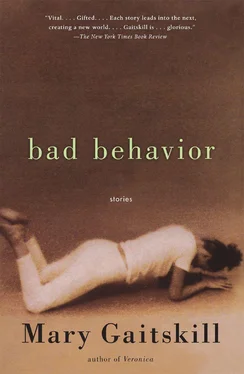Susan could actually remember her response: “I’m so sick and tired of hearing the words ‘directed’ and ‘career,’ I could scream.”
“But you do want a career, don’t you?”
“No. I want to work at Dunkin’ Donuts when I get out of school. I want to get fat. Or be addicted to heroin. I want to be a disaster.”
“Why? Oh, you’re joking. But I know what you mean. I’m sick of these closed-minded career people too. It’s just that I’m getting tired of feeling like a stupid … well, a stupid cunt. I want to do something with my talent. I know I’ve got talent.”
Susan ate her toast and stared at her, loving her, almost gloating over her. She loved her tiny fingers, her hot face, her bright nervous energy, her pathetic assertion that she had talent. That she talked like the worst stereotype of the girliest girl imaginable only enhanced her appeal. Susan could not explain this perverse love to herself, but there it was. Perhaps it was so strong because she had almost no other female friends in college; most of her emotional energy had been spent on men — she’d had fewer affairs than Leisha but spent twice the time brooding over them. Maybe the extremities and obviousness of a cartoon girl were all that she could handle in another woman. It was probably for this reason that Leisha chose to be a cartoon girl, she thought sadly.
The curious thing was, Leisha had loved Susan too, at least initially, as another kind of caricature. Susan had been surprised to hear that for months she’d been a source of jealousy and speculation, that Leisha had been deeply puzzled by this solemn, self-contained and (to Leisha) weirdly silent girl. Besides, Susan had quite a reputation in Ann Arbor herself, thanks to their mutual boyfriend. “She’s nothing like she looks,” he’d say to anyone who’d listen. “She’s kinky as hell.” Then he’d generously explain how and in what ways, somehow managing to leave his kinkiness out.
“You remind me of black stiletto heels,” Leisha had said. “I used to picture you all in black, in stretch pants and spike-heeled shoes.”
“Oh, brother,” said Susan. But she was flattered.
The apartment Susan was staying in belonged to an old friend named Bobby, who was in Europe for the month and hadn’t bothered to arrange a sublet for so short a time. It was located in the Village only a few blocks from the apartment she had lived in for most of her time in Manhattan. It was much larger than her old apartment, and brighter.
Her apartment in Chicago was even larger than Bobby’s. It had high ceilings and large windows; it was fashionably decorated with soft colors and spare-limbed furnishings. It was kept clean by a weekly maid. She had attractive kitchen accessories in matching colors. She remembered Leisha visiting her tiny Manhattan studio and laughing at her, incredulous that after four months Susan’s utensils were still limited to two forks, a knife and a spoon.
She went into Bobby’s bedroom and looked at herself in the long mirror, a plump woman wandering calmly toward middle age, standing with one arm wrapped around her waist and a drink in her hand. She had never thought she would be plump or calm. Ten years ago, even six years ago, she never gained weight, no matter how much she ate. Her sudden plumpness was such a novelty that she enjoyed it rather than fighting it, as did most women her age. “You’ve finally come into your real … look,” her mother said approvingly. “You’re not a skinny kid anymore.” This late maternal acceptance had pleased her to such an extent that she found it somewhat sad; just a few years earlier she would’ve rejected it as the words of a woman glad to see the last of an unreasonable reminder of youth and insouciance in the form of her unusually slender daughter.
Her life in New York had been erratic and unconnected. She had lived hand to mouth most of the time, working a series of menial jobs that made her feel isolated and unseen, yet strangely safe. She ate dinners of rice and beans or boxes of Chinese takeout food on the floor. She stayed up until seven or eight in the morning working on her manuscripts, and then slept all day. She went to Harlem to interview voodoo practitioners. She went to nightclubs and after-hours bars, standing on the periphery of scene after scene with Leisha or some other, less central girlfriend. She took long walks late at night, especially in winter, loving the sound of her own muted footfalls, the slush-clogged city noises, and the sight of the bundled, shuffling drunks staggering home, looking up in surprise to see a young woman walking alone at 4:00 A.M. The desolation and cruelty of the city winter horrified and fascinated her. She was astonished by the contrasting layers of existence sitting so closely atop one another, and the desperate survival of bag people and misfits wedged into the comfortless air pockets and crawl spaces between layers. During her first year in the city she gave spare change to anyone who asked her. Eventually she gave money only if she happened to have some in her hand when she was asked.
Her relationships with men at that time were disturbing; she had conversation after conversation with Leisha, agonizing over why she always wound up with these terrible people. She remembered them all in an embarrassing blur: the pretty, delicate drug addict, the masochistic Chinese boy, the pretentious Italian journalist, the married professor, the pompous law student, the half-crazy club owner who almost strangled her one night with his belt. The guy she met and screwed in the rest room of some tiny East Village bar, the one who later involved her in an exhausting ménage à trois with his Italian girlfriend. Leisha had violently (and primly, Susan thought) disapproved of that one. Strangely enough, after fleeing what she contemptuously labeled “conventional” and “suburban” for anything “unconventional” she could safely lay her hands on, Leisha had performed an indignant and sudden about-face, calling the bohemia she’d adopted “pretentious” and “fake.” When Susan didn’t follow, Leisha had said things like “It’s just horribly painful to even be around you when you’re involved in this adolescent, self-destructive garbage.”
It was too bad Leisha couldn’t see her now, with her steady job, her matching housewares, her kind and gentle boyfriend. It was also annoying to know that Leisha would come to some happy conclusion about her based on the current trappings of her life (“How wonderful it is that Susan has become so stable”) and then compare her favorably with the younger Susan. Susan examined her clearly lined face as she stood before the mirror. There had been changes in her during the last six years, and she thought most of them were good. But she was still, for better or worse, the same woman who had drunkenly screwed a stranger in the reeking can of a tacky bar and then run out into a cab, smiling as she pressed her phone number into his hand.
She sighed and went into the “living area,” leaning against an exposed brick wall to look out a curtainless window. It seemed as though her friendship with Leisha had never been what she would now call a friendship at all, but a complex system of reassurance and support for self-involved fantasies that they had propped up between them and reflected back and forth. Susan now identified her early fascination with Leisha as a vicarious erotic connection with the ex-lover they had both slept with. She did not fantasize about Leisha and this man together, but she had been oddly gratified to experience secondhand the dynamic between him and this throaty-voiced little bad girl, and to reflect this dynamic back to Leisha, making it more of a drama by becoming another character in the story. Leisha had done the same, clearly enjoying her two-way link with their lover and the mysterious, contrary, perverse woman he had described to her, this tackily glamorous icon of a dirty-magazine woman who was also her reliable friend Susan. During the first year of their friendship they discussed and described him, pro and con, right down to the blond pinkness, the raised, strangely exposed quality of his genitals, and they were both greatly amused to discover that the sight of them talking and giggling together unnerved him.
Читать дальше












